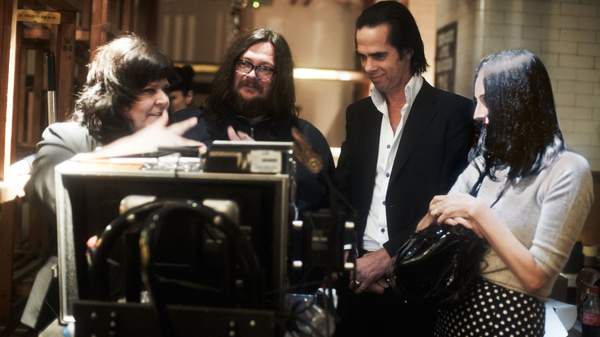Overview
A documentary about Nick Cave would and could never be quite the usual documentary; Nick Cave isn’t quite the usual man. Veering away from the regular celebrity ‘True Hollywood Story’ expose style, from the rock music documentary with more shots of fans screaming and the musician performing than anyone cares to experience on VHS or digital format, co-directors Iain Forsyth and Jane Pollard set about creating a different type of cinematic biography. Which all started with a little phrase scratched into one of Nick Cave’s notebooks:
’20,000 days on earth.’
“There’s something big and incredibly intimate about how long you’ve been on earth, and what you’ve done while you’re here.” Pollard crackled from London through the receiver. Their initial filming project, which had begun as a bread-and-butter behind-the-scenes coverage of the new Push the Sky Away album started blooming into something else. “It felt like he was taking something very, very simple and turned into something with a sense of grandness – like the man who fell to earth, and spending some time on earth... It’s also the classic idea that the rock star is not quite of this world.” Forsyth’s voice added about the discovery.
After two hard days spent unpicking Nick Cave at the seams by a Freudian psychologist, weeks spent recording their album Push the Sky Away, hours in an archive trawling over Nick Cave’s immense life, half hour conversations with both Kylie Minogue and ex-band member Blixa Bargeld, and a pandering monologue voiceover by Cave stretched over the top to fill the gaps, a mythological documentary which has no home in either the documentary or fiction genre was forged. But for practicality’s sake 20,000 Days on Earth been filed as a documentary, and as such has so far been awarded two Sundance Awards for editing and directing in the World Cinema Documentary category.
Documentaries have always been the cornerstone of cinema. Film’s initial conception was in the form of a short actualite, a mini-documentary set about recording life ‘as it is’. Much later, around the 60s, music documentaries became a thing, Rolling Stone officially coining the phrase ‘rockumentary’ in 1969. But it was exactly this overt style of storytelling that Pollard and Forsyth wanted to avoid. “We set out to do a film which wasn’t like other music documentaries.” Pollard said. Earlier this year at a Berlinale press conference she observed that “truth’s not that interesting, it’s a very narrow road to take our imaginations down”.
“It’s still hard for us to think of it as a documentary” Pollard confesses. “While you’re working you’re doing the best work you can, but I don’t think you stop to think about where it fits in the world… Although we definitely drew inspiration from documentaries like The Imposter, in which fact and fiction is bent, so it’s just a warping of the usual journalistic style.”
More interestingly, the fact-fiction and myth created on screen had little to do with either Pollard or Forsyth – the directors only carefully storyboarding scenes and arranging cameras, letting Nick Cave and the other people from his life improvise around the cameras, completely unscripted. Which did create a problem for any kind of narrative arc. “ It was a big challenge… The way we ended up pinning out the documentary was with the psychoanalyst interview, which had been shot over two days five months before, each interview lasting 10 hours. Through that we wanted approach everything – memory, what happens when he goes on a stage as a performer, what he worried about, what influenced him, his first sexual experience... after that we worked out the topics which we thought were going to be the most interesting. So we had a bit of time – those five months before shooting properly began – to figure out what the shape of our documentary was going to be.”
The enigma of identity is something the usual documentary filmmaker and biographer would approach head on, but Forsyth and Pollard’s film explores it tangentially. Their main intention was never to ‘uncover’ Nick Cave, or to strip him of that aura “like other documentaries do”. Although the film does at times serve as a very personal, downplayed portrait of Cave, especially while in the archive.
Forsyth muses, “After listening to Nick Cave and the Bad Seeds writing the song ‘Push the Sky Away’ we knew we would have those two parallel tracks in the narrative – the process of having his songs being recorded to being performed, and his daily life from waking up to going to sleep. The song was just so fragile, it was unlike anything we had heard before. I remembered thinking ‘God it feels like you’re standing on the edge of the world, that you could at one moment just drop off’. And that, it’s human experience, you feel massive and then moments later you feel insignificant… That’s also the idea behind the last scene, Nick standing on the edge of the world, the camera moving out and him becoming a part of a bigger scene – that thing of him being a god but just a man.” Nick echoes those sentiments in the film. "Being on stage meant I got to be that person I always wanted to be," he asserts, "then, you look down into the front row, and someone yawns."
